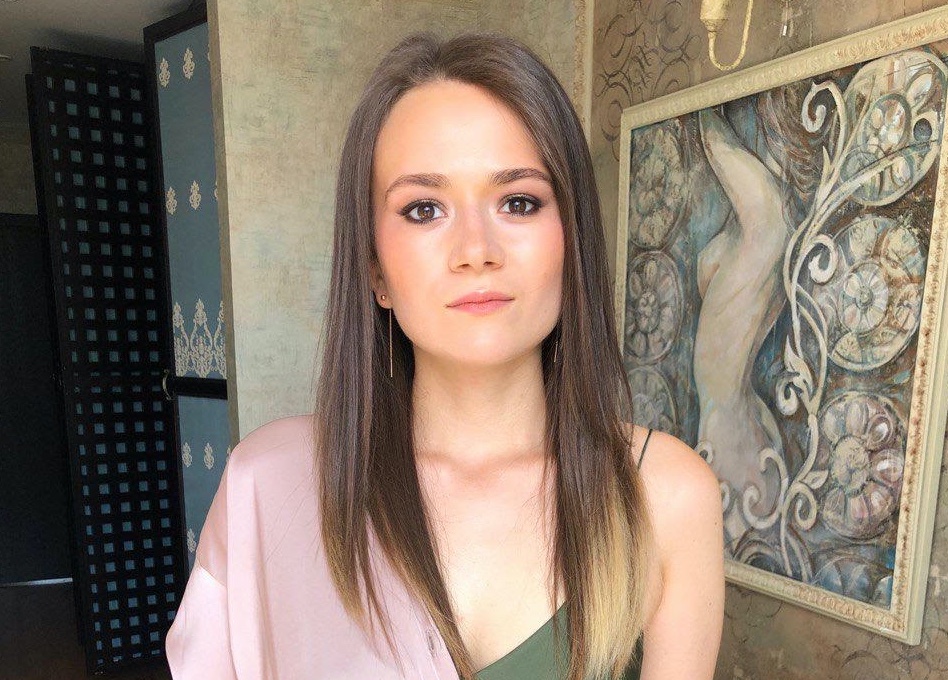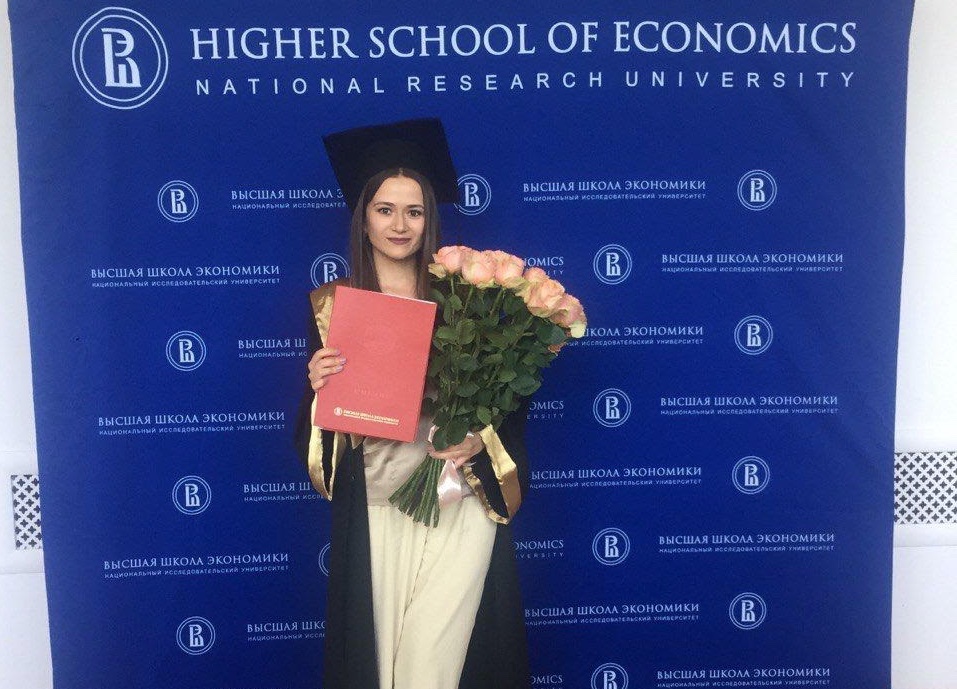"There is no one unique approach to any given client in the Middle East"

Jamila Fomina earned her Master’s in Financial Economics from ICEF in 2020 and her bachelor’s from HSE Faculty of World Economy and International Affairs. Jamila served at SBER CIB Treasury and later joined Citi, serving currently as a senior corporate banking analyst in Dubai. Here’s what Jamila thinks contributed to her graduation with honours, what makes a multinational bank an exciting place to be, and how the business culture in the Middle East is different from that in Europe.
About being two-time ICEF applicant
I earned my bachelor’s from HSE Faculty of World Economy and International Affairs. I wasn’t looking to become its student, actually – it was my math tutor who advised me to enroll in HSE as a provider of broadly scoped degrees in economics and politics. I can’t say I was prepared to enter the workplace after my bachelor’s study. I have always had a passion for learning, I am good at it. I was top student in my class. My excellent performance earned me the invitation to ICEF’s master’s programme. I was in my fourth year when I got it and I firmly decided to become a Master of Financial Economics. And since ICEF was my dream school, I didn’t consider any other majors. I actually applied ICEF’s bachelor’s programme alongside with that of HSE Faculty of World Economy and International Affairs, but I failed to score for the tuition-free place. I qualified for master’s, though, and this solved all my queries as to what to do after my bachelor’s study.
I liked that my bachelor’s had a strong concentration in languages, but I was no less willing to study economics, hence my choice of ICEF. Its programme promised solid training in Corporate Finance – the topic I was keenly interested in back then.
About mathematics
Math isn't exactly my strong suit, but I am a quick learner. People told me I would struggle at ICEF, but I was prepared to study hard and graduated with honours. It’s hard to believe but I even had the time to teach Microeconomics and English in my first year and to work at Sber in my second. Honestly, I had a tough time with Stochastic Analysis – I was absolutely new to it and was putting in a lot of effort to pass my exams as excellently as the students of HSE Faculty of Economic Sciences. Microeconomics, Macroeconomics and Statistics were the subjects I developed a passion for while a bachelor’s student. I excelled in them, fell in love with them, and even taught them in my first year as a master’s student.
About Corporate Finance
I’ve always wanted to get into banking. My mom worked her whole life in a bank. She often took me to work with her when I was a child, so financial environment has never been a stranger. Having worked for some time at VTB, I realized personal banking wasn’t my idea of a good job, I only wanted to work with businesses, large ones. My dream job was in a multinational, so I ended up at Citi, precisely its corporate banking division where I dealt with the entire range of products including investment. Corporate finance is where I would like to continue to grow professionally. I enjoy doing my tasks, I like everything about Citi’s system of approaches and its culture in general. Corporate finance feels good career-wise and emotionally, although at first I felt I lacked the hand-on knowledge.

That was because MSc Financial Economics turned out to have less focus on corporate finance than I expected. But it offered excellent courses in Investment Analysis and M&A. These two became my favorites and made me a top-performing student. A useful add-on for ICEF’s master’s programme was the Moscow State University School of Finance and its teaching team of highest-profile banking officers. This school can really benefit those who want to work in IB.
About Sber and Citi
One of the courses I chose to study at ICEF was Financial Programming. It was taught by Igor Goncharenko, who then was in charge of the liquidity management system at Sber CIB Treasury. He hired me to work as part of his team. The job involved the use of my programming skills to model forex balance – something that I’m no longer dealing with but gave me ample knowledge of the bank’s divisions.
Why did I leave my job at Sber? Compared to a multinational bank, Sber remains a rather closed industry in terms of corporate culture and prospects of development. My job there kept me working mostly with figures and tables, while I was looking to deal more with building relationships with clients. I wished I could get more opportunities for, and gain experience in, global communications, so I left for Citi, which did meet my definition of a satisfying workplace with career prospects. Divisions simply don’t exist at Citi. There is no such thing as department in this bank. Instead, its teams are cross-functional, allowing you to learn from colleagues or relocate to anywhere in the world to learn the practice of conducting business in different countries. This constitutes the core advantage of a multinational and offers lifelong growth for everyone.
I currently communicate a lot with product partners and customers, and I must say I like my current job much better. The corporate sector is run by seniors, who are the highest level and lay communication channels with the client, be it a bank or a brand. The seniors are assisted by teams of their right-hand men who make transactions happen on the side of the client. I am exactly one such right-hand person. I manage the communication with the clients for the seamless day-to-day service. I like my job because it embraces all the versatility of a bank’s product line. It requires the understanding of absolutely every minor detail of the process. I often joke that we are like a one-stop-shop service, we are those minor officers who know absolutely everything and can handle absolutely any kind of problem for the client.
About committing herself to CIB
CIB being all work and no sleep isn’t a myth. In Moscow I started at ten and stayed up until midnight at best. There were days when work seemed to never end.
My current job in the Middle East is definitely more flexible. I can make time for myself after 8 p.m, which was absolutely impossible in Moscow with its busy weekday schedule
My job in Moscow sometimes required me to work of weekends. I did my best to keep the weekends free, but that had not always been easy. If you want to survive in CIB, you’ve got to be 100 percent determined to go on with what you do. Keeping your motivation fueled is key, you’ve got to be a beggar for work, otherwise you’ll find yourself burnt out even before your career in CIB gets started.
About moving to Dubai
At one point in my career, I decided to try to work abroad. After nearly all my clients moved to SDN, the volume of business curtailed severely. The options were two – move to an overseas office or quit. The latter option was a no-no because Citi was too good an employer, so I started to consider relocation and chose Dubai.
To someone like me, who never even moved house and had lived her whole life together in a family, moving to a new country was like moving to outer space. What doubled the stress was that my relocation coincided with that of my boyfriend. We were due for two different countries. I was to figure out how to live alone in a foreign country, find housing, and open bank accounts as a Russian national.

Work dropped off substantially after I moved to the Middle East. But, despite my less demanding workload, the number of clients has increased. Instead of just one country, I am now responsible for several. My scope of duties hasn’t changed and still involves communication with customers, transaction services and support, approvals, documentation, etc. The only change is my location and that I no longer deal with the Russian banks. All my previous experience and knowledge did prove relevant here. The business culture in the Middle East is not without its peculiarities, but I’m doing quite alright.
About Middle Eastern business habits
One challenge is that there is no one unique approach to any given client in the Middle East. Unlike Russians, who tend to stick to European mindset and share Western European values, the people in the Middle East are more conservative in their ways of conducting business. Here, business is hierarchical. Moreover, some Arab countries still prefer to communicate solely with men for historical, cultural and social reasons, whereas in the Russian banks the junior positions, often held by women, can communicate freely with top management.
Another habit typical of the Middle Eastern culture is laziness. It is peculiar to all professions and standings
This explains why many processes are slow here, requiring extra effort to speed things up and get people do what they are expected to.
My current role is still in corporate finance, and I am not planning to move to a new division. Although, I feel that in the long run I might want to move to strategy – I enjoy modeling business processes and seeking ways to increase their efficiency. Strategic direction is experiencing a rapid growth at Citi. It might be interesting for me to contribute to Citi’s transformational strategy, but, given the current turbulence, it’s hard to say when I will be prepared to make my next move.
About education and career
ICEF, and HSE in general, has not only given me the competence but increased my employability due to its brand-name recognition. Good knowledge of economics is useful not only in work, but in life, it gives the understanding of the global processes and cause-and-effect relationships, making one a better decision-maker.
Degrees from ICEF identify their holders as promising candidates, at least in Moscow. The impression HSE graduates make on job interviewers is that of versatile personalities who are prepared to take the challenge. ICEF benefits its students also through its alumni: success stories grow in number, driving the growth of the ICEF alumni community around the world. In today’s geopolitical situation, it serves like a stepping stone to interesting collaborations and contact with all kinds of companies.
Igor Sergeevich Goncharenko